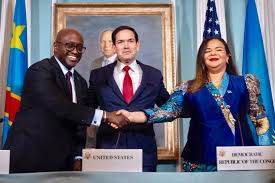The Democratic Republic of Congo and Rwanda have agreed to begin implementing key security measures under a peace deal mediated by the United States, starting October 1, 2025. The joint statement released by both countries, along with the United States, Qatar, Togo, and the African Union Commission, marks a significant step toward ending decades of conflict in eastern Congo.
The agreement was reached at a high-level meeting in Washington on September 17–18 and comes after months of delays and concerns that progress on the peace plan had stalled. According to the deal, the two countries will work to complete the measures by the end of the year.
Sources familiar with the talks said operations to neutralize the Democratic Forces for the Liberation of Rwanda (FDLR), a Congo-based armed group linked to Rwanda’s 1994 genocide, would begin between October 21 and 31. At the same time, the plan includes facilitating the withdrawal of Rwandan troops from Congolese territory. The timeline is seen as crucial in addressing concerns that earlier agreements had failed to deliver results.
Congo and Rwanda had first signed a peace deal on June 27 in Washington, witnessed by U.S. President Donald Trump. The deal sought to build on a 2024 agreement in which Rwanda pledged to lift defensive measures within 90 days. However, delays in setting up a joint security coordination mechanism meant that implementation timelines were repeatedly pushed back. Officials now say the “90-day clock” began only after the coordination body first met on August 7–8.
At the September Washington meeting, both sides agreed on an operational order to advance the 2024 agreement. Members of the joint coordination mechanism also shared intelligence reports that shaped a phased strategy for dealing with the FDLR, the withdrawal of forces, and Rwanda’s lifting of defensive measures.
Despite the progress, internal reports from the talks revealed that deep-rooted disagreements remain. One major sticking point is Rwanda’s relationship with the rebel group M23. Kinshasa accuses Kigali of supporting M23 fighters, who have launched repeated offensives in eastern Congo. Rwanda denies the allegations and says its military actions in Congo are defensive, aimed at countering threats from groups like the FDLR.
The dispute over M23 dominated much of the Washington discussions, according to documents seen by Reuters. U.N. experts, in a July report, concluded that Rwanda maintained command and control over M23 operations, a claim Kigali strongly rejects.
Another issue is the size and strength of the FDLR. While Congo argues that neutralizing the group requires coordinated regional action, Rwandan representatives insisted it is Kinshasa’s responsibility.
Speaking at the United Nations General Assembly this week, Congolese President Felix Tshisekedi maintained a tough stance, saying the withdrawal of Rwandan troops and an end to Kigali’s alleged support for M23 were “non-negotiable conditions for genuine peace.” Rwanda, however, has reiterated its commitment to the U.S.-mediated peace plan.
Meanwhile, Congo has also been engaged in direct talks with M23 in Doha, Qatar, though an August 18 deadline for a peace agreement was missed. The lack of progress in those negotiations has further highlighted the importance of the Washington-led framework.
Diplomatic sources said the heads of state of both countries are expected to travel to Washington for the signing of a regional economic integration framework, though no date has yet been set. The final negotiation session on this framework is scheduled for next week.
The mineral-rich region at the heart of the dispute is home to vast reserves of tantalum, cobalt, lithium, copper, and gold, resources crucial for global industries such as electronics and renewable energy. The U.S. has been keen to stabilize the region to encourage billions of dollars in Western investment.
Observers say successful implementation of the peace plan could ease tensions that have fueled cycles of violence in eastern Congo for three decades. However, the challenges highlighted in Washington underscore the fragile nature of the process and the deep mistrust between Kinshasa and Kigali.
